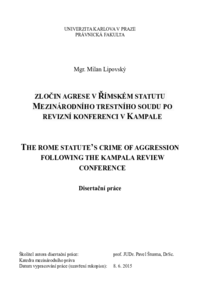Zločin agrese v římském statutu mezinárodního trestního soudu po revizní konferenci v Kampale
he Rome statute's crime of aggression following the Kampala review conference
rigorózní práce (UZNÁNO)

Zobrazit/
Trvalý odkaz
http://hdl.handle.net/20.500.11956/128303Identifikátory
SIS: 177567
Kolekce
- Kvalifikační práce [14868]
Autor
Fakulta / součást
Právnická fakulta
Obor
Právo
Katedra / ústav / klinika
Katedra mezinárodního práva
Datum obhajoby
22. 6. 2016
Nakladatel
Univerzita Karlova, Právnická fakultaJazyk
Čeština
Známka
Uznáno
Klíčová slova (česky)
Zločin agrese, Římský statut, Mezinárodní trestní soud, revizní konference v Kampale, rezoluceRC, Res. 6Klíčová slova (anglicky)
Crime of aggression, Rome Statute, International Criminal Court, review conference in Kampala,resolution RC, Res. 6Název práce: Zločin agrese v Římském statutu Mezinárodního trestního soudu po revizní konferenci v Kampale Definice zločinu agrese byla přijata v roce 2010 k vyplnění mezery předpokládané článkem 5 odst. 2 Římského statutu Mezinárodního trestního soudu (dále jen "MTS"). Komplikované diskuse předcházející přijetí předurčily mnohé problematické aspekty v rámci definice, včetně vztahu MTS a Rady bezpečnosti OSN (dále jen "RB") - zda RB bude jediným orgánem s pravomocí zahájit řízení pro zločin agrese či nikoliv; dále včetně právního režimu humanitární intervence pro účely její kriminalizace dle Římského statutu; pozice pachatele zločinu - zda by měly být za ně považovány jen "vůdčí" postavy nebo i "níže" postavení činitelé; jak změny vstoupí v platnost - podle článku 121 odst. 4 nebo 5 Římského statutu, atd. Mnohé z těchto otázek nebyly uspokojivě zodpovězeny v rámci přijatého textu, a tak zatímco mezinárodní společenství oslavovalo úspěch přijetí definice nejvyššího zločinu, mnozí (včetně autora této práce) byli zklamáni nedostatky přijatého textu. Znalci v doktríně stále prohlubují své znalosti definice a jejích důsledků a s přibývajícím časem od přijetí textu, se ukazuje, že, má-li být efektivním prostředkem odstrašení pachatelů zločinu agrese, musí být definice přepracována.
Title of the dissertation: The Rome Statute's Crime of Aggression following the Kampala Review Conference The definition of crime of aggression was adopted in 2010 to fill the gap in article 5 (2) of the Rome Statute of the International Criminal Court ("ICC"). Complicated discussions preceding the adoption have identified many problematic aspects within the definition, including the relationship between the ICC and the UN Security Council ("SC") - whether the SC would be the only body capable to commence proceedings for the crime of aggression or not; further including the legal status of humanitarian intervention for the purposes of its criminalization under the Rome Statute; position of a perpetrator of the crime - should only leaders be considered perpetrators or should "lower" state officials be included; how should the amendment enter into force - under article 121 (4) or 121 (5) of the Rome Statute; etc. Many of these questions have not been answered by the adopted definition in a satisfactory way and so while the international community was celebrating the success of the adoption of the "supreme crime's" definition, many (including the author of this dissertation) have been seriously disappointed by the short-comings of the adopted text. Scholars continue to better understand the...
